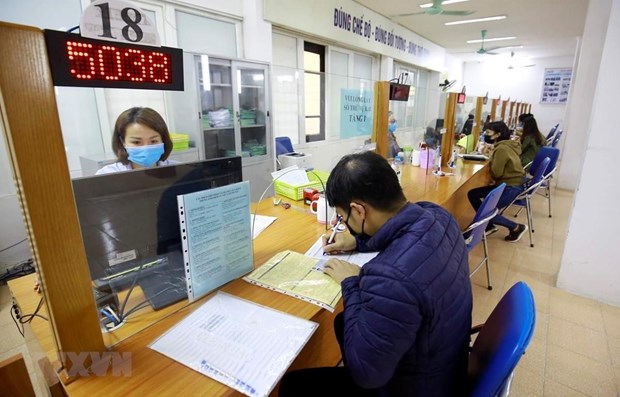ILO: COVID-19 causes loss of 305 million of jobs in the second quarter
Since the outbreak of the COVID-19 pandemic, more than one in six young people have stopped working, while those remaining in employment have seen their working hours decrease by 23 percent, according to the International Labour Organization (ILO).
 People register for unemployment insurance benefits (Photo: VNA).
People register for unemployment insurance benefits (Photo: VNA).Hanoi (VNA) – Since the outbreak of the COVID-19 pandemic, more than one in six young people have stopped working, while those remaining in employment have seen their working hours decrease by 23 percent, according to the International Labour Organization (ILO).
The ‘ILO Monitor: COVID-19 and the world of work, 4th edition’ shows that young people are being disproportionately impacted by the pandemic. It also shows the substantial and rapid increase in youth unemployment seen since February is affecting young women more than young men.
A ‘shock’ to young people
The latest analysis updates the estimates for the reduction in working hours in the first and second quarters of 2020, compared to the fourth quarter of 2019.
An estimated 4.8 percent of all working hours were lost during the first quarter (equivalent to approximately 135 million full-time jobs, assuming a 48-hour working week). The number of jobs lost in the second quarter was at 305 million.
From a regional perspective, the Americas (13.1 percent), Europe and Central Asia (12.9 percent) presented the largest shares in working hours lost in the second quarter.
The pandemic is inflicting a triple shock on young people. It is destroying their employment, disrupting their education and training, and placing major obstacles in the way of those seeking to enter the labour market or to move between jobs.
The youth unemployment rate in 2019 was already higher than in any other group at 13.6 percent. There were around 267 million young people not in employment, education or training (NEET) worldwide.
People aged between 15 and 24 years old, who were employed, were also more likely to be in forms of work that leave them vulnerable, such as low paid occupations, informal sector work, or migrant work.
“The COVID-19 economic crisis is hitting young people – especially women – harder and faster than any other group. If we do not take significant and immediate action to improve their situation, the legacy of the virus could be with us for decades. If their talent and energy is side-lined by a lack of opportunity or skills it will damage all our futures and make it much more difficult to re-build a better, post-COVID economy,” noted Guy Ryder, ILO’s Director-General.
 Guy Ryder, ILO’s Director-General (Photo: ILO)
Guy Ryder, ILO’s Director-General (Photo: ILO)As such, the report calls for urgent, large-scale and targeted policy responses to support youth, including broad-based employment/training guarantee programmes in developed countries, and employment-intensive programmes and guarantees in low and middle-income economies.
How can we help the economy and workforce recover?
The Monitor analyses measures being taken to create a safe return-to-work environment. It says that rigorous testing and tracing of COVID-19 infections, “is strongly related to lower labour market disruption… [and] substantially smaller social disruptions than confinement and lockdown measures.”
In countries with strong testing and tracing, the average fall in working hours was reduced by as much as 50 percent.
There are three reasons for this: testing and tracing reduces reliance on strict confinement measures; promotes the public confidence and so encourages consumption and supports employment, and helps minimise operational disruption at the workplace. In addition, testing and tracing can itself create new jobs, even if temporary, which can be targeted towards youth and other priority groups.
“Creating an employment-rich recovery that also promotes equity and sustainability means getting people and enterprises working again as soon as possible, in safe conditions,” said Ryder. “Testing and tracing can be an important part of the policy package if we are to fight fear, reduce risk and get our economies and societies moving again quickly.”
The Monitor reiterates its call for immediate and urgent measures to support workers and enterprises along the ILO’s four-pillar strategy: stimulating the economy and employment; supporting enterprises, jobs and incomes; protecting workers in the workplace, and relying on social dialogue for solutions./.













